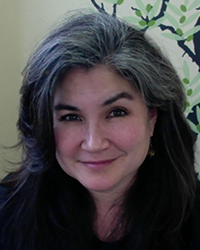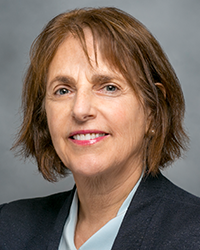7th Cancer Cachexia Conference
September 28-30, 2023 | Edinburgh, Scotland
Advancing knowledge and clinical interventions in cancer cachexia

Organizing Committee
Chair:
Teresa Zimmers, PhD
Co-Chairs:
Bette Caan, PhD
Imed Gallouzi, PhD
Andrew Judge, PhD
Barry Laird, MBChB MRCGP MD
Richard Skipworth, MBChB MD FRCS
Bei Zhang, PhD
Teresa Zimmers, PhD

Committee Chair Teresa Zimmers, PhD is Professor of Cell, Developmental and Cancer Biology at Oregon Health and Science University and Research Scientist at the Portland Veterans Administration Medical Center. She co-leads the Cancer Biology Program of the Knight Cancer Institute, the Patient Resiliency Program of the Brenden Colson Center for Pancreatic Care and leads the Oregon Cachexia Working Group. Her research centers on the systemic effects of cancer, particularly secreted protein mediators. She served on the Scientific Conference Committee for the 2nd Cancer Cachexia Conference in 2014 and was a co-organizer for the 3rd, 4th, 5th, and 6th Cancer Cachexia Conferences. She is co-founder and current President of the Cancer Cachexia Society.
Bette Caan, PhD

Bette Caan, PhD leads a research program on energy balance and cancer survival with a focus on the role of muscle, specifically sarcopenia, myosteatosis and cachexia on cancer outcomes. Her research group is among the first to understand that one potential explanation for obesity paradox in cancer is that overweight and mild obese may confer survival advantages because they have the necessary muscle reserves for superior prognostic outcomes. This led them to focus specifically on using body composition to understand the contribution of both muscle and adiposity in non-metastatic cancer and determine if and how that differs from the role of muscle and adiposity in cachexia seen with advanced cancers. We have shown that BMI as a measure of body size and weight loss or weight gain is inadequate to fully understand the role of body composition in cancer survival. This evidence has the potential to lead to changes in clinical practice by using Computerized Tomography already collected for clinical diagnosis to identify patients at risk of sarcopenia and cachexia, risk stratify them and target them for interventions to improve muscle mass and cancer survival.
Dr. Caan started and led the webinar series funded by NCI on Body Composition and Cancer Outcome Research that now continues under the direction of NCI. She currently sits on the American Cancer Society Committee on Guidelines for Nutrition and Physical activity for Cancer Survivors. She is a population scientist with expertise in the measurement of body composition, development of large cohort studies, behavioral intervention trials and analyses of large data sets and have over 475 peer reviewed publications.
Imed Gallouzi, PhD

Dr. Imed Gallouzi joined KAUST as Professor of Bioscience and Developmental Biology and as Associate Director of the KAUST Smart-Health Initiative. From 2001-2021, Imed was Professor of Molecular and Cellular Biology, at the Biochemistry Department, Faculty of Medicine and Health Sciences, McGill University, Montreal, Canada. He received his Ph.D. in 1998 from Université Montpellier II, France and did a postdoctoral training from 1998 to 2001 at Yale University.
He held a Tier II Canada Research Chair in Cellular Information Systems from 2002 to 2012 and is a full panel member of several national and international funding agencies such as CIHR, CCSRI, FRSQ and NIH. Prof. Gallouzi’s research focused mainly on the role of posttranscriptional mechanisms in cellular adaptation to stressful and pathological conditions. In 2000, he was the co-discoverer of the cytoplasmic RNA granules known as stress granules and their importance in the stress response of the cell. He was also the first to use cell-permeable peptides to delineate the shuttling pathways of RNA-binding proteins (RBPs). In 2012, his observation connecting stress granules formation to the prevention of cancer-induced muscle wasting was selected by the Canadian Cancer Society Research Institute as one of the top 10 findings of the year. More recently, he made significant contributions to the field of cancer cachexia-mediated muscle wasting by uncovering the role of the RNA Binding Protein (RBP) HuR in the onset of this deadly syndrome. Prof. Gallouzi is also interested in the role of RBPs in senescence and aging.
During his tenure at McGill University, Prof. Gallouzi held several key administrative positions locally and internationally. He chaired the Graduate Advisory Committee of the Biochemistry Department at McGill University from 2008 to 2014 and he was appointed in 2019 as the associate chair (education) of the Biochemistry Department. The same year, he was appointed as the academic coordinator for a new Pre-Med program in French at McGill commissioned by the Quebec Government. In 2014 he was hired by KAUST BESE as a visiting professor for six months, during which he established the Molecular and Cellular Biology teaching lab for the BESE MSc program. He also helped Hamad Bin Khalifa University (HBKU), Doha, Qatar, to establish a Life Science Division and its graduate and research programs. At HBKU, he established two graduate (MSc and Ph.D.) programs, Biological and Biomedical Sciences (BBS) and Genomics and Precision Medicine. Prof. Gallouzi played a key role in implementing the Life Sciences Division at KBKU, which was transformed to become the new College of Health and Life Sciences in 2018. Prof. Gallouzi also has a passion for teaching and training students.
Andrew Judge, PhD

Andrew R. Judge, PhD is a Professor of Physical Therapy. Research in the Judge lab is focused on identifying molecular mechanisms that are causative in cancer-induced skeletal muscle atrophy, weakness and associated muscle pathologies. Their research utilizes clinical samples obtained from cancer patients, and pre-clinical models that recapitulate the clinical phenotype. While most of this work is focused on skeletal muscle tissue itself, because cachexia is a systemic metabolic disorder their studies also include evaluation of other peripheral tissues including the heart, liver, and fat, as well as circulating factors released from cancer and non-cancer cells that may be involved in driving the atrophy response.
Prof. Judge has co-organized the Advances in Skeletal Muscle Biology in Health and Disease Conference five times and served on the organizing committee for the Cancer Cachexia Conference in 2021. He is Associate Director for Training at the University of Florida Myology Institute and is passionate about facilitating the educational and research experiences of trainees. In this regard, he is co-Director on a Team-Based Interdisciplinary Cancer Research T32 Training Program and co-Director on a Neuromuscular Plasticity T32 Training Program which, combined, pull together my interests in cancer, muscle, and education and training.
Barry Laird, MBChB MRCGP MD

Dr Barry J A Laird holds positions as a Reader (Associate Professor) in Palliative Medicine at the University of Edinburgh, and consultant physician posts in the Edinburgh Cancer Centre and St Columba’s Hospice. He graduated in medicine from the University of Glasgow and completed specialist training in palliative medicine. He was awarded a prestigious National Cancer Research Institute fellowship and joined the University of Edinburgh in 2007 (Professor Fallon’s Group) where he has remained. Working in the field of supportive oncology and starting cachexia research in 2010, he was awarded a fellowship from the European Palliative Care Research Centre (PRC). Following his mentorship from the late Professor Ken Fearon, he continues to develop research in cancer cachexia. He is passionate about transforming the landscape of this through improved understanding of the genesis, mechanisms and treatment via an evidence based translational research programme from basic science to clinical trials. He works on a programme of interventional clinical trials in cancer cachexia in either CI or Senior PI roles, has secured over $5million in funding and supervised doctoral students. His trials range from characterisation work (REVOLUTION), basic interventions (optimal background cachexia care, ENERGY), anti-inflammatory trials (MENAC) and targeted therapies including immunomodulation and cannabinoids. His work has demonstrated that the host/tumour inflammatory response influences survival, quality of life, lean mass, treatment outcomes and has provided valuable insight into the genesis of cachexia and related symptoms. He has published over 150 papers, is part of ESPEN and ESMO guidelines groups, and is a member of the NIHR Cachexia Group and Cancer Cachexia Society.
Richard Skipworth, MBChB MD FRCS

Richard Skipworth is a Consultant Upper GI and General Surgeon at the Royal Infirmary of Edinburgh; Honorary Reader at the University of Edinburgh; NHS Research Scotland (NRS) Clinician; Fellow of the Royal College of Surgeons of Edinburgh (RCSEd); and Secretary of the Cancer Cachexia Society. He has been involved in human translational and clinical research in cancer cachexia for almost 20 years, following on from his original doctoral research under the supervision of Professor Kenneth Fearon. For his work, he has been awarded the Syme Medal from RCSEd (2012), and the Cuthbertson Award from The Nutrition Society (2020). He co-leads a Scotland-wide national collaborative of universities and hospitals involved in cachexia research, named the Caledonian Cachexia Collaborative. He is passionate about clinical trial development in cachexia, either as investigator-led initiatives or in collaboration with pharma, and in training the next generation of clinical researchers.
Bei Zhang, PhD

Dr. Bei B. Zhang is a seasoned pharmaceutical executive and a proven leader. She is currently Vice President at Pfizer Worldwide Research, Development & Medical in Cambridge, MA. She is leading research from setting strategy to advancing projects in the pipeline in multiple disease areas including cancer cachexia and cachexia associated with chronic diseases, cardiometabolism and heart failure, renal diseases and metabolic disorders, from discovery to clinical development. Dr. Zhang is also leading state-of-the-art technology omics and imaging platforms to enable innovation and discovery.
During 2010 – 2017, Dr. Zhang was Vice President at Lilly and the founding General Manager and Site Head/SVP of the Lilly China Research and Development Center (LCRDC) in Shanghai where she led a talented research organization and advanced programs in pipeline. Prior to joining Lilly, Dr. Zhang was the Franchise Site Lead of diabetes discovery research in Merck Research Laboratories in Rahway, New Jersey, with a team of ~100 scientists. Dr. Zhang played a key role in the discovery, development and launches of sitagliptin (JANUVIA®) as a novel blockbuster for diabetes. She led teams to bring numerous drug candidates from the laboratory to clinical testing and human proof-of-concept.
Dr. Zhang has an excellent track record of scientific accomplishment illustrated by lectures at numerous scientific conferences and over 145 original articles in peer-reviewed scientific journals. She is regarded as a leading expert in the field and in pharmaceutical research and development. Dr. Zhang was elected to the Scientific Advisory Board and the Board of Directors of Keystone Symposia.
|